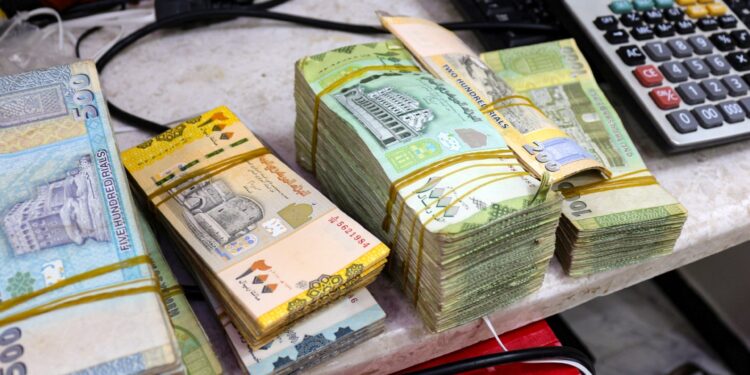5/19/2024–|Last updated: 5/19/202410:56 PM (Mecca time)
The Yemeni riyal recorded a significant decline against the dollar, exceeding the level of 1,720 riyals to the dollar in Aden and the governorates of southern and eastern Yemen, according to merchants and dealers in exchange companies. This came amid an unprecedented wave of high prices and rising commodity prices, which portends an economic disaster and famine.
The price of the dollar crossed the threshold of 1,720 riyals, the lowest level of the Yemeni currency in about two years. This coincides with a stifling electricity crisis that is exhausting residents in Aden and neighboring governorates as summer enters and temperatures exceed 36 degrees Celsius.
The value of the local currency is currently falling despite the Central Bank of Yemen resuming auctions to sell foreign exchange to commercial banks, days after it received two batches of economic support announced by Saudi Arabia to the internationally recognized government in Aden.
The Central Bank (main center – Aden) said in a statement that last Thursday, it sold $21.874 million in its seventh auction this year, and it is conducting it via an electronic platform.
An exchange office in Aden reported to Reuters that the exchange rate in parallel black market transactions this evening, Sunday, exceeded the barrier of 1,720 riyals for purchase and 1,730 riyals for sale, a difference of 70 riyals from the exchange level a week ago and 120 riyals a month ago.
This is the lowest value recorded by the local currency since the announcement of the transfer of power and the formation of the Presidential Leadership Council in April 2022 with the support of the Saudi-led coalition.
A senior official at the Central Bank in Aden declined to comment to Reuters about the reasons for the continued collapse of the currency’s value. He said: “Measure the current decline in the exchange market to the total value, and you will find that it is negligible in a situation that is the worst ever for a country without resources, relying on the central bank to cover its obligations.”
Fighting with the Houthi group in northern Yemen has largely stopped over the past year, but the Saudi-backed government in Aden is suffering due to the decline in the value of the currency, a shortage of foreign reserves and rising prices.
The internationally recognized Yemeni government says that the economy suffered losses of about two billion dollars due to the cessation of crude oil exports after the Houthi group targeted oil ports in the south and east of the country in late 2022.
There are two competing central banks in the country, one of which is subject to the recognized government in Aden and the other to the Houthi group in Sanaa.
The exchange rates of the riyal in the capital and the areas under the control of the Houthi group in the north of the country remain stable at 530 riyals to the dollar, according to banking sources.
Continued pressure
Wahid Al-Fudaei, a researcher specializing in economic and banking affairs, said that the renewed collapse of the local currency exchange was the result of local and regional factors, the most important of which was the war in the country and the economic disasters it caused.
He added that the Houthi group’s attack on oil export ports at the end of 2022 was the straw that broke the camel’s back, with the Aden government’s oil exports completely stopping, which caused it to lose the most important resource in its budget, which exceeds 70%, according to government estimates.
Al-Fudai warned of further pressure on the Yemeni riyal and the deterioration of its value against foreign currencies if the situation continues as it is.
Abu Ahmed (50 years old), a government employee in Aden, said while holding a handful of local banknotes: “This is 50,000 riyals. I used to get a 10-kilogram bag of sugar, a bag of rice with the same amount, a carton of tomatoes, baby formula, and other things for me and my children to eat. Now this amount is enough.” For just a bag of rice and a kilo of sugar.”
He added: “Our children are hungry… we are hungry. The fall in the value of the riyal has killed us, and we have become unable to provide the basic necessities of life, and the power outage has killed our nerves and our souls.”
Bassam Ali Omar (40 years old), also a government employee, said: “The citizen has begun to suffer from the deterioration of services, the collapse of the currency, and the deterioration of economic and living conditions.”
Political deadlock
Commenting on this, Yousef Saeed, professor of economics at the University of Aden, said that the rapid decline in the exchange rate of the Yemeni riyal is due to many factors, the most important of which are:
- The absence of any new economic tributaries that would help resolve the situation.
- The continuing political stalemate between the warring parties.
- Tensions in the Red Sea.
According to economic centers, the Yemeni riyal decreased by more than 300% from what it was before the war, when the exchange rate was stable at about 214 riyals to the dollar in 2014.
Observers fear that the Yemeni currency will continue to collapse and reach two thousand riyals against the dollar by the end of the year, which threatens the occurrence of a famine that threatens millions of Yemenis.



